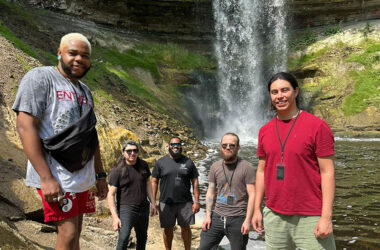Be smart. Don’t panic. Be vigilant.
“That’s what you need to do to be OK,” said Dr. Bernard Heilicser. “And you will be OK.”

Heilicser, the emergency medical system director of South Cook County EMS for the last 36 years, and a Flossmoor resident, says it’s true that the COVID-19 pandemic is unprecedented in our lifetimes.
“We’ve had serious flu epidemics before,” he said, ”but not with these numbers.”
At South Cook County EMS, which operates through the UCMedicine/Ingalls Memorial health care system, Heilicser continues to train south suburban paramedics, police officers and other medical professionals for exactly the type of crisis that COVID-19 represents.
“Are they prepared for this?” he said. “Absolutely.”
Heilicser, known to two generations of first responders at “Dr. Bernie,” said EMS and police personnel are trained for all types of catastrophic situations, from biohazards to infectious diseases to severe weather events.
“They are taught how to respond to emergencies with a wide variety of circumstances,” he said. “They are prepared.”
During the COVID-19 emergency, it’s important that members of the public do their part, Heilicser said. We have already heard much about hand-washing and keeping a social distance and he reiterated that those are important steps in keeping healthy.
Beyond that, he said, it’s crucial that the public does not overtax the emergency response system during a time of crisis.
“First thing – you don’t get a test (for the coronavirus) just because you’re scared,” Heilicser said. Because of delays on the national level, widespread testing for COVID-19 is still not available. Right now, coronavirus testing is only available to people who already have serious symptoms, he said, adding that “there is still a lot of influenza” left over from this winter.
“People should not call 911 because they want to be tested,” Heilicser said. “That will overwhelm the emergency response system in our municipalities.”
People with concerns about their health should call their family physician, a hospital emergency department or the Illinois Department of Public Health hotline, he said.
“That way they’ll get guidance on what to do,” he said.
Heilicser stressed that he is not suggesting that people ignore their health concerns during the coronavirus emergency. But, in the weeks to come, EMS personnel will need to concentrate on people needing the most medical care and should have the time and ability to make that possible.
“If someone is sick or has a medical emergency, they should call 911,” he said. “We are here to protect our community.”
Heilicser said all the steps that have been taken in the last few weeks – shutting down schools and dine-in restaurants, closing libraries and canceling theater and sporting events – are designed to ultimately slow the spread of the coronavirus.
“It’s going to take some time for this to be resolved,” he said.
When more testing is finally available, results will show just how many people in our communities have been infected with COVID-19. Heilicser said many people with the virus will not have serious symptoms but will still be capable of passing it on to others.
“I will be surprised if we do not see cases in our area,” he said.
First responders are trained to think preemptively about how they will deal with emergencies, Heilicser said, and we should do the same. He offered a few words of advice for conduct during the coronavirus emergency.
“Please pay attention to the science and not to the politicians,” he said.
Residents should have an emergency supply of food and water in case they need to be confined to their homes for a while. It’s also a good idea to get refills on prescription medication, as well as making sure that there is a supply of over-the-counter products like aspirin or vitamins.
Heilicser has been a volunteer member of the Flossmoor Fire Department since moving to the village in the 1980s. He is also the medical director of Illinois Task Force 1, an urban search and rescue team that responds to disasters in the state. In addition, he is deputy medical director of the Illinois Medical Emergency Response Team, a not-for-profit group made up of hundreds of volunteers from across the state. He has responded to tornados and floods and was on the relief team that went to Haiti after the 2010 earthquake.
After so many years in emergency medicine, Heilicser says our first responders are up to the challenges that COVID-19 is bringing to our communities this year.
“We are very, very fortunate,” he said. “Our communities and first responders work very well together. I’m always so appreciative of the way our folks work together and for their caring.
“I wouldn’t have done this for the last 36 years if I didn’t think they’re great.”



